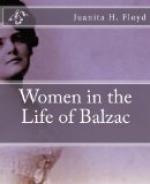Balzac could scarcely control his grief at parting, but he was not separated from his Predilecta long. The following month he spent several days with her at Baden-Baden, saying of his visit:
“Baden has been for me a bouquet of sweet flowers without a thorn. We lived there so peacefully, so delightfully, and so completely heart to heart. I have never been so happy before in my life. I seemed to catch a glimpse of that future which I desire and dream of in the midst of my overwhelming labors. . . .”
The happiness of Madame Hanska did not seem to be so great, for, ever uncertain, she consulted a fortune-teller about him. To this he replies: “Tell your fortune-teller that her cards have lied, and that I am not preoccupied with any blonde, except Dame Fortune.” As to whether she was justified in being suspicious, one can judge from the preceding pages. Balzac always denied or explained to her these accusations; however true were some of his vindications of himself, he certainly exaggerated in assuring her that he always told her the exact truth and never hid from her the smallest trifle whether good or bad.
In October, 1845, the novelist left Paris again, met his “Polar Star,” her daughter and M. de Mniszech at Chalons, and accompanied them on their Italian tour by way of Marseilles as far as Naples. On his return to Marseilles on November 12, he invested in wonderful bargains in bric-a-brac, a favorite pursuit which eventually cost him a great deal in worry and time as well as much money. Madame Hanska had supplied his purse from time to time.
Although he was being pressed by debts and for unfinished work, having wasted almost the entire year and having had much extra expense in traveling, Balzac could not rise to the situation, and implored his Chatelaine to resign herself to keeping him near her, for he had done nothing since he left Dresden. In this frame of mind, he writes:
“Nothing amuses me, nothing distracts me, nothing enlivens me; it is the death of the soul, the death of the will, the collapse of the entire being; I feel that I cannot take up my work until I see my life decided, fixed, settled. . . . I am quite exhausted; I have waited too long, I have hoped too much, I have been too happy this year; and I no longer wish anything else. After so many years of toil and misfortune, to have been free as a bird of the air, a thoughtless traveler, super-humanly happy, and then to come back to a dungeon! . . . is that possible? . . . I dream, I dream by day, by night; and my heart’s thought, folding upon itself, prevents all action of the thought of the brain—it is fearful!”
Balzac was ever seeing objects worthy to be placed in his art collection, going quietly through Paris on foot, and having his friend Mery continue to secure bargains at Marseilles. A most important event at this period is the noticeable decline in the novelist’s




